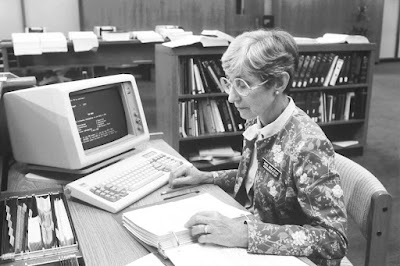Gliding through the timeline of AI History, you will get to know about the vehement efforts of the computer scientists who were determined, against the spoiler critics and stood for their 'faith' of having human-like understanding in the lifeless computers. The efficiency which we see today in our computers are undoubtedly the gift of the creative minds who had their guts mathematically excelled. Right from the 1950's to present day artificial intelligence has always awed general public with its miraculous efficiency and capabilities. Dive deep into the AI history further in this article.
1950 - Turing Test (Imitation Game)
Turing was a computer scientist who wanted to prove that 'machines can think'. At Manchester University in 1950 Turing released a paper called 'computer machinery and intelligence' to test the ability of a computer to think and communicate with the intelligence and understanding of a human. The paper consisted of questions asked while testing the computer in the 'Imitation game' also known as the 'Turing Test'.
The Turing test was played between three players, who were placed in three separate rooms to preserve anonymity, but to play the game were connected via a keyboard and screen. No player could really tell if the player he is playing with is a human or a computer. One player would be a machine while the other two were humans. Among the three, one would be the interrogator who was given the task to determine which of the other two players was a computer. The computer had to imitate the communication skills of a human being to fool the interrogator.
Result: The computer was unsuccessful to pass this imitation game.
(1955-56) - The Term AI Was Coined
Allen Newell and Herbert A. Simon was the first artificial intelligence programmer. With the name "Logic Theorist" they induced a program in which 52 theorems were to be proved. Out of 52 theorems of 'Whitehead' & 'Russel's Principia Mathematica' 38 theorems were proved by the program with phenomenal preciseness.
Computer scientist, John McCarthy who is regarded as the father of 'Artificial intelligence', first coined the name 'AI'. In a conference about the 'Dartmouth Summer Research Project on AI [DSRPAI], John McCarthy termed 'Artificial Intelligence' to be used in the academic field as a course of study.
1960 - Eliza
One of the first chatbots simulates conversations as a psychotherapist
Joseph Weizanbaum, the inventor of the chatbot - 'ELIZA', was very consoling towards people with psychological instability. So, he introduced a chatbot which could aid psychotherapists in treating the psychological problems of people. It was believed to be a great step towards the well-being of the human brain.
ELIZA's program was written in 'MAD SLIP' and its source code is available on digital platforms such as archive.org. The directive of the program was simple. ELIZA read the scripts as patterns and engaged patients in conversation.
This was a milestone, perhaps of those times, given the programmer's capability to induce a bot through a program to engage people. It mesmerized the participants with its human-like communication. ELIZA although it couldn't communicate with lots of understanding, it was successfully implanting the 'Lisp' method to be used to train a bot.
1970 - 2000s : AI Winter
2014 : Alexa
1997 : Deep Blue
In 1997, the chess computer Deep Blue, developed by IBM, won a six-game match against world chess champion Garry Kasparov. The development of Deep Blue began in 1985 at Carnegie Mellon University as 'Chip Test' and was later moved to IBM, which specialized in software and hardware development. The computer was initially named 'Deep Thought' and later renamed 'Deep Blue' in 1989.
Deep Blue specialized in cracking board games and was designed specifically to play chess. The match between Deep Blue and Kasparov attracted a lot of attention from the media and chess enthusiasts worldwide. The computer won the match 3.5-2.5, making it the first time a computer had ever defeated a world champion in a chess match.
2011 : Siri
In 2011, Siri was first integrated into the iPhone 4S as an intelligent speech assistant. It allowed users to interact with their phones through voice commands, making tasks like making calls, sending texts, and setting reminders much easier. Siri's introduction marked a significant milestone in the development of AI technology, as it showcased the potential for natural language processing and voice recognition to make our lives more convenient. Today, Siri is available on a range of Apple devices, including iPhones, iPads, and Mac computers.
2016 : Tay
In response to the situation, Microsoft replaced Tay with a new chatbot named Zo. Microsoft acknowledged that Tay's replies were based on its interactions with people on Twitter, but due to trolling, the bot malfunctioned and made inappropriate comments. The incident highlighted the potential dangers of AI and the importance of programming ethical guidelines into machine learning systems
2017 : Alpha Go
2018 : Ethics Guidelines
2022 : Introduction of Chatgpt
The chat generative pre-trained transformer by OpenAI is a significant breakthrough in the field of artificial intelligence. It can interpret the user's intent and generate responses to their queries in a natural and conversational tone. The system uses a pre-trained transformer methodology that allows it to learn and understand the nuances of language by training on a large corpus of text data. This makes the system capable of providing accurate responses to even the most complex questions. With this innovative technology, the world of chatbots and virtual assistants has taken a significant step forward, making it easier for people to find the information they need.
2023 : Introduction of GPT4
On March 14, 2023, GPT Plus was released to the public, but in a limited form. This new version of the language model is the talk of the town as it can take images as well as text as input. It is a game-changer in the world of AI and has already been integrated into various applications. Duolingo has added GPT4 in its application as "Roleplay" and "Explain my answer," which has made learning more interactive and engaging. Khan Academy is using it as a 'tutoring chatbot' which they have affectionately named 'Khanmigo.'
In addition, two other applications have also induced GPT4-powered assistance. 'Be my eyes' has introduced it as a 'Virtual Volunteer,' while 'GitHub Copilot' has integrated it as 'Copilot X.' These applications are expected to revolutionize their respective industries, and GPT4 has undoubtedly played a pivotal role in their success.




